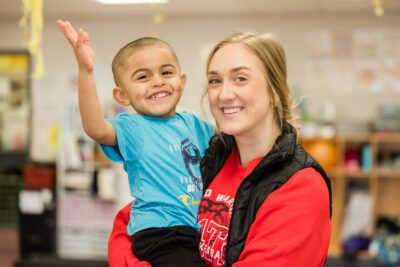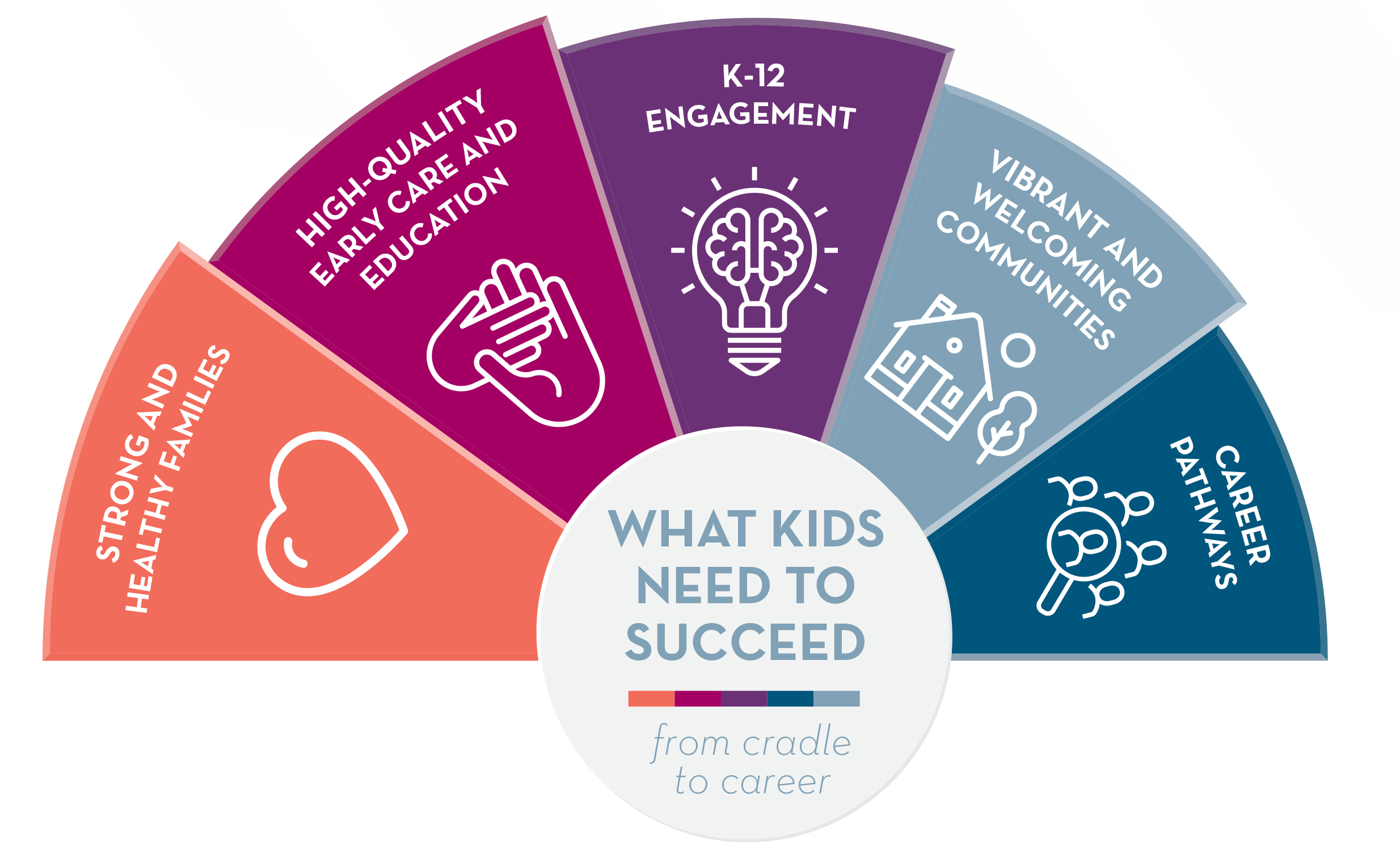Creating prosperity for all our kids and the communities they call home is how we Grow Our Own in southwest Minnesota.

To reach the future we want for our region, we need to ensure all our kids and families are set up for success. In 2016, our Board of Directors made the strategic decision to sharpen our focus and combine our work in economic development, community impact and giving around a single purpose: our kids. We launched a comprehensive, 10-year strategy called Grow Our Own to align resources, build momentum, and close the opportunity gap for our kids by investing in the people and systems that surround them.
Grow Our Own uses a cradle-to-career approach based on The Saguaro Seminar research. Strong and healthy families, high quality early care and education, K-12 engagement, vibrant and welcoming communities and career pathways are what kids need to succeed.

Grow Our Own is guided by four main goals:
- Change negative narratives that impact economic mobility
- Reduce sources of stress in the lives of children and families
- Strengthen core life skills
- Support responsive relationships
Each of these goals move us toward economic mobility, when all people in southwest Minnesota attain a reasonable standard of living, experience the dignity that comes from having power and autonomy over their lives and are engaged in and valued by their community.
Learn more about the concepts and research that have shaped our approaches, goals and outcomes.
Grow Our Own Timeline
2016
Phase 1 of our 10-year strategy laid the groundwork for taking a systems approach to closing the opportunity gap by engaging community members and creating awareness of the significant gap that exists right here in our region. We launched with the 2016 Grow Our Own Summit at Southwest Minnesota State University in Marshall. More than 500 people attended to hear Robert D. Putnam, Malkin Professor of Public Policy at Harvard University. He gave a keynote based on his book “Our Kids: The American Dream in Crisis”.
Our affiliate partners received Grow Our Own challenge grants of $2,500 each to partner with a local organization and complete a project supporting youth in their community. All of our then-25 affiliate partners were invited to apply, and just shy of half submitted an application. All applicants received funding.
As a way to understand more about ourselves as individuals and how we connect with neighbors across our region, staff used the Intercultural Development Inventory (IDI), a cross-cultural assessment of intercultural competence. The IDI highlighted where intercultural skills needed improvement to help us communicate with, connect and support community members across differences. This was an early step in what would become our welcoming and belonging work around the region.
2017
Southwest Initiative Foundation staff visited with civic groups, schools, employers, city and county officials, faith communities and other groups about the opportunity gap and local strategies to close it. These community conversations were based on findings in a report we commissioned, “A Profile of Youth Poverty and Opportunity in Southwestern Minnesota.”
The report was authored by Marybeth J. Mattingly, Andrew Schaefer and Douglas Gagnon. Dr. Mattingly is director of research on vulnerable families at the Carsey School of Public Policy and a research assistant professor of sociology at the University of New Hampshire.
SWIF was selected as one of nine community foundations across the country to participate in the Rural Economic Development Philanthropy Innovation Network (REDPIN). As part of the program, we identified child care as a key economic development challenge to tackle. We created a task force of 15 child care providers, educators, agencies and employers to help map the child care system in southwest Minnesota.We identified focus areas that continue guiding our work in this space, including project investment and technical assistance, community planning, professional development, public policy and public relations.
2018
Hundreds of employers, educators, students, elected officials, nonprofits and service providers, community leaders, and concerned citizens joined the Southwest Initiative Foundation for the 2018 Grow Our Own Summit. During the summit, we shared new ideas, became inspired to take action that will benefit youth, as well as our businesses, organizations, schools, communities and families, and laid the groundwork for new partnerships and programming in our region.
Support for career readiness efforts in school districts around our region accelerated in the first phase of Grow Our Own. This includes opportunities like the CEO (Creating Entrepreneurial Opportunities) program, a year-long course designed to provide students with an overview of business development and processes through hands-on experiences. SWIF provided an initial $10,000 grant in 2014 to the Willmar Area Community Foundation to establish CEO in Kandiyohi County. In 2018, we supported the launch of Southwest MN CEO. Since then, we’ve helped start four more CEO programs in our region.
SWIF was also one of 23 partners that financed the $1.2 million TigerPath Initiative, which included an update to the career and technical education space at Hutchinson High School, renamed the “Center for Technical Excellence.” And we are a founding partner of Launch Your Future Today (LYFT), a rural career and technical education (CTE) pathway initiative. The goal of LYFT Pathways is for every secondary student in the region to gain marketable skills through meaningful CTE courses and opportunities that lead to further education and careers that match our region’s workforce needs.
2019
As we entered Phase 2, we were introduced to the work of the U.S. Partnership on Mobility from Poverty. Their approach to creating economic mobility for individuals and families fit our holistic approach, and we adopted goals that focused on advancing economic mobility for all who call southwest Minnesota home:
- Change negative narratives that impact economic mobility
- Reduce sources of stress in the lives of children and families
- Strengthen core life skills
- Support responsive relationships
The McKnight Foundation awarded us a $600,000 grant over two years to support the Southwest Minnesota Teacher Preparation Partnership, a unique career pathway model created by Worthington Public School District, Minnesota West Community and Technical College, Southwest Minnesota State University and Southwest Initiative Foundation. This partnership aims to increase the diverse pool of quality teacher candidates in the region. It is also focused on what it takes to support students who want to teach, especially students of color who don’t often see teachers who look like them in their classrooms.
We were part of The Aspen Institute Community Strategies Group 2019 project to explore Rural Development Hubs — organizations at the heart of positive development and inclusive action in rural places.
2020
We began the year with big plans for Grow Our Own, working with communities and partners to implement innovative ideas to help our kids succeed. Then, the COVID-19 pandemic hit. It brought human loss and suffering, halted our economy, and changed our daily lives. Southwest Initiative Foundation was ready for emergency response and leveraged resources, expertise, and connections to deploy $6.4 million dollars through grants and loans—more than doubling our grant volume and quadrupling our loan volume from the previous year.
At the same time, longstanding disparities that separate people along racial and economic lines came into full view. It gave new urgency to our vision of southwest Minnesota being a place where all people thrive and led to efforts like our virtual anti-hate awareness and action forum to help communities develop strategies to be more vibrant and welcoming.
As a new member of Welcoming America, we partnered with three communities to host the first Welcoming Week celebrations in southwest Minnesota. Welcoming Week activities in Willmar, Worthington and Granite Falls centered on the theme “Creating Home Together through Art.” Events took place outdoors, where attendees could be physically distanced while following health and safety guidelines.
2021
As we celebrated our 35th anniversary of helping write southwest Minnesota’s success story, we continued balancing immediate pandemic response and recovery with long-term strategies.
We launched Help for Helpers, an online collection of tools to support mental and emotional wellbeing for teachers, child care providers, health care workers, assembly line workers and other helpers in communities.
More than 300 caring adults logged on to “The Power of One,” a virtual forum we hosted featuring award-winning speaker and bestselling author, Josh Shipp. He spoke about how every kid is one caring adult away from being a success story, and we each have a role to play in making sure our kids succeed.
Southwest Initiative Employer Resource Network® launched to support working families and area employers. The first of its kind in Minnesota, the ERN® takes an innovative approach to workforce development, combining job retention services, work supports, education and training. The ERN® USA model was highlighted at the 2018 Grow Our Own Summit.
2022
This year marked the start of Phase 3 in the Grow Our Own Strategic Plan. Carrying forward all we learned during the first phases of Grow Our Own, we committed to being stronger inside and out as the work continues. We will build on the momentum around supporting our kids, while centering economic mobility to reach our vision of a southwest Minnesota where all people thrive. As part of strengthening our team, we added four community impact staff members to focus on rural equity, youth and family and civic and community engagement.
Our time with CFLeads’ Economic Mobility Action Network came to a close in 2022, leaving us with resources, tools and a support network to push economic mobility efforts forward. CFLeads is a national network of community foundations committed to strengthening community leadership muscle, sharing field innovations, and tackling the key issues of our time. One of our biggest undertakings from this was a commitment to healing work and relationship building with the Native communities of the Cansa’yapi Oyate (Lower Sioux Indian Community) and Pezihutazizi Oyate (Upper Sioux Community). Our land acknowledgment statement was a first step in the process.
What’s Next?
Our innovative programming and community building efforts will continue. We will also evaluate and plan for Grow Our Own and beyond to develop continued strategies and commitment that help all southwest Minnesotans thrive.




